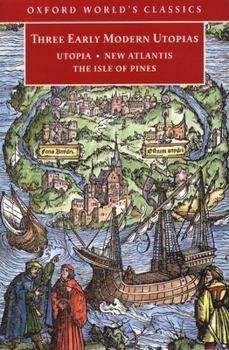Three Early Modern Utopias: Thomas More: Utopia / Francis Bacon: New Atlantis / Henry Neville: The Isle of Pines
Select Format
Select Condition 
Book Overview
With the publication of Utopia (1516), Thomas More provided a scathing analysis of the shortcomings of his own society, a realistic suggestion for an alternative mode of social organization, and a satire on unrealistic idealism. Enormously influential, it remains a challenging as well as a playful text. This edition reprints Ralph Robinson's 1556 translation from More's original Latin together with letters and illustrations that accompanied early...
Format:Paperback
Language:English
ISBN:0192838857
ISBN13:9780192838858
Release Date:January 1999
Publisher:Oxford University Press, USA
Length:320 Pages
Weight:0.51 lbs.
Dimensions:0.7" x 7.7" x 5.0"
Customer Reviews
3 ratings
Interesting tales, particulary the lesser-known "Isle of Pines"
Published by Thriftbooks.com User , 15 years ago
As usual, Oxford does a good job with translations, introductions and notes. More's "Utopia" is the longest and best of the three works presented in this book, at least as far as fleshing out the details of how a utopian civilization would really look, particularly when situated among other civilizations. But, since most people are familiar with it to some degree, I'll discuss the other two writings in more detail. Bacon's "New Atlantis" is the least satisfying of the three utopian civilizations. First, it isn't complete, barely beginning before it ends. Second, it seems to be more about scientific specialization (i.e. how the New Atlantic culture has made great strides in various fields of science [e.g. agriculture, astronomy]) than about utopian society per se. It is interesting how Bacon relates these islanders, far from Europe, to the famed ancient Atlantean society. Neville's "Isle of Pines" is an interesting tale of shipwreck and discovery. A ship sinks near the coast of a faraway island, killing everyone except a man with the last name "Pine" and a few women, one of whom is black. What follows is a fascinating story of old/new-world racism and debauchery. Basically, the Pine fellow starts bedding ALL the women (two of whom, if I recall, are sisters) because, you know, they're not getting rescued any time soon and they've got to keep civilization going. Eventually, they all dispense with the wearing of clothes. Then ALL the women get pregnant and turn into baby factories and everyone breeds like rabbits until there are hundreds of people within one or two generations. The interesting tack that Neville takes is that Pine only sleeps with the black woman at night, she "craftily" sneaking into his bed. In addition, her progeny happen to be the bad apples of the island, which is discussed from the perspective of some visiting sailors many years after the shipwreck. Fascinating view into the European mind from several centuries back.
Good collection
Published by Thriftbooks.com User , 15 years ago
I have enjoyed Oxford World Classics for a long time because of the notes, biographies, and other content that is added to the book to supplement the stories themselves. This is a decent collection of three stories, with all the necessary notes and such. If you're curious about Utopia, buy this book and you'll get two other visions of Utopia as well, making for a good overall reading experience (once you get past the old language, which is rather clunky at times, but that is how it was written) and you'll learn a few things too.
Prose which still affects our thinking
Published by Thriftbooks.com User , 24 years ago
Literature before James Joyce, before Jane Austen, before Daniel Defoe: No Ulysses, no Emma, no Robinson Crusoe - for modern readers it is hard to imagine a stock of English literature without the existence of these and other important writers and their `novels'. What kind of literature could one refer to in a pre-novelistic age? As a matter of fact, there were authors, such as Sir Thomas More and Sir Francis Bacon, who wrote prose which, indeed, still affects our thinking. However, neither More nor Bacon used English, but chose Latin as their original means of expression. For what reasons? And none of these authors was in fact a free-lance writer - they were all occupied in public and political spheres. What made them actually write fictional works? How does their fiction relate to their cultural environment - or, what was regarded as `fiction'? These texts cover a century of political, religious, scientific and literary debates and gave rise to a new understanding of knowledge, and introduced influential literary devices.






